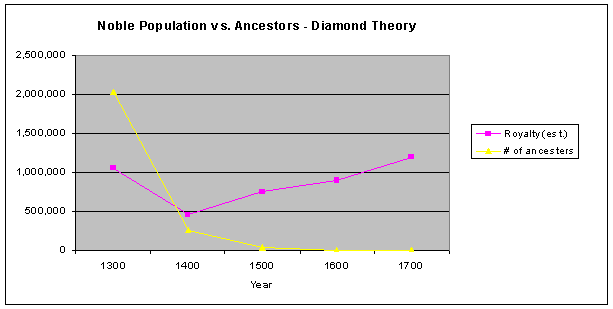

Do you ever wonder if you have noble ancestry? Most probably, you do. Here's why:
You have 2 parents, 4 grandparents, 8 great-grandparents, and so on. For every generation that you go back, you double the number of ancestors that you have (there are exceptions to this rule, but that comes later). Now, most genealogists assume that a generation is about 30 years; that is, on the average, your parents were born 30 years before you. Actually, generations are becoming longer these days, compared to, say, 200 years ago, when people would often marry in their teens and have families at a young age. But for our purposes, let's assume an average of 33 years for convenience. That way, we can assume exactly 3 generations per century. So, if you were born in 2000, then you had 8 ancestors born around 1900. Each century you go back in time, you multiply your number of ancestors by 8. That means, that you had 64 in 1800, 512 in 1700, and so on. If you work your way back to the year 1200, you had over 16 million ancestors! This could be called the exponential or geometric growth of ancestors.
For most of you who reached this page through elvidge.com, most of your ancestors lived either in the so-called "New World" (North America, Australia, etc.), or Europe. Earlier than 1600, they probably pretty much all lived in Europe. Interestingly enough, according to the theory of geometric ancestry, some time between 1100 and 1200, the number of ancestors you had would have exceeded the entire population of Europe. See the figure below (by the way, the big dip in population during the 13th century was due to the plague.)

As you can see, the yellow line will never cross the pink line, meaning that you would never have more ancestors in a closed society than there are people. What is the point of all of this?
Well, it goes back to the original intent of this essay; namely, to answer the question regarding the likelihood of noble roots. What does "nobility" mean anyway?
The 'Lectric law Library defines nobility as follows: "The upper social class in feudal Europe. They were characterized by the following: a. Ownership of land, as a vassal to another lord; b. A military obligation to the king; c. An administrative obligation to the king; d. Possession of heraldry. Nobility was roughly divided into two classes: Noblesse de epee (of the Sword) - Knights; and, Noblesse de robe (of the Robe) - administrators"
The popular definition of nobility varied from country to country and may have included multple sub-classes. The more distant one's connection to a royal line, the "lesser" of a noble that they were. At some point the distiction was quite arbitrary, and the classes merged. By some estimates, roughly 1-2% of the population of pre-Renaissance Europe was considered nobility. If we plot that population against the Diamond Theory estimate of ancestors (see below), we see that roughly around 1400, each one of us had as many European ancestors as there were nobles. The likelihood that none of those half million ancestors had any noble roots is exceedingly small. Therefore, the answer is yes, you probably have royalty in your background. Then again, who cares. So does everyone else!
In fact, a very good argument can be made that the less blue blood you have, the healthier your gene pool. For more on this, click here.
